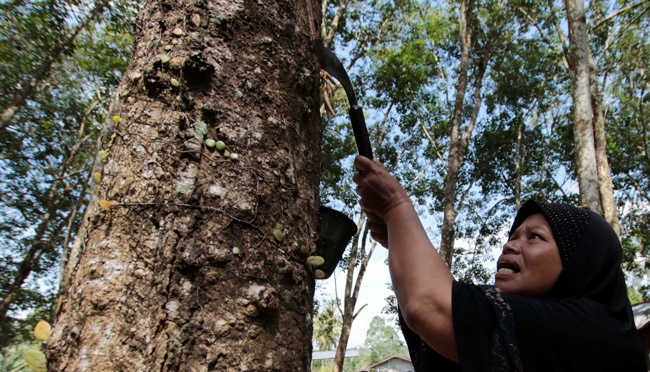News
International Rubber Conference 2024 held in Yogyakarta
WINDONESIA December 7, 2024 (Tempo)
(Tempo)
No less than 250 rubber industry players from 13 countries that include, among others, Malaysia, Cote d'Ivoire, and France, met at the International Rubber Conference 2024 in Yogyakarta from Nov. 19-21, 2024. On the first day, they highlighted various issues regarding natural rubber. One of them is the ongoing rubber disease outbreak that has yet to be cured and is gradually affecting global production, including in Indonesia.
"The world's rubber industry players are currently still dealing with the pestalotiopsis disease outbreak that has struck since 2018, which has reduced rubber productivity by around 40 percent," said International Rubber Research Development Board (IRRDB) Secretary-General Seri Dato' Aziz Abdul Kadir on the sidelines of the forum's opening on Nov. 19, 2024.
Aziz said that several countries have tried various methods to combat the outbreak, but they have not found satisfactory results. Through the forum held by the Rubber Research Center, IRRDB, and the Japan International Cooperation Agency (JICA), an attempt was made to create a formula that could be applied to combat the outbreak.
"We brought together scientists and industry players in this forum to find a way out of the outbreak," he said.
Meanwhile, Indonesian Rubber Companies Association (Gapkindo) Secretary Uhendi Haris revealed that the pestalotiopsis outbreak in Indonesia was estimated to have hit no less than 600,000 hectares (ha) of rubber land.
"Before the outbreak, Indonesia's rubber production was still above 3.6 million tons per year, but after the outbreak it was only 2.2 million tons per year at most," said Uhendi.
He added that that natural rubber has become an economic accelerator for rural development on large islands such as Sumatra, Java, and Kalimantan. Natural rubber also continues to play an important role as a strategic commodity in Indonesia's agricultural sector, with a foreign exchange contribution of US$1.76 billion in 2023.
Uhendi noted that Gapkindo itself oversees around 127 natural rubber processing operator companies. When the rubber epidemic hit and affected rubber production, as many as 2.1 million rubber farmer households were affected.
"Some rubber farmers who work with the industry chose to change professions when production decreased, we estimated that currently only 1.5 million farmers are still active out of 2.1 million farmers," he revealed.
Uhendi said that there is no effective way to combat the rubber epidemic. They can only rely on natural factors and weather to reduce its impact.
"In today's material, several researchers have offered options to combat the epidemic's impact, such as through biofungicide technology, chemical pesticides, and others. We hope to implement them soon," he said.
Rubber Research Center Head Suroso Rahutomo said that the performance of the natural rubber industry itself in Indonesia has not been not optimal, with domestic rubber production volume falling by 3.6 percent year-on-year (yoy) over the past five years. That resulted in a decrease in the supply of rubber raw materials to crumb rubber factories. This shortage of supply has had a major impact on Indonesia's natural rubber exports, which have fallen by 8.36 percent yoy.
"In the past few years, more than 50 crumb rubber companies have stopped operating due to a lack of raw materials," he divulged.
Several factors have caused the decline in the performance of the Indonesian natural rubber industry, including low rubber prices for more than a decade. Finally, many farmers have left rubber plantations, stopped tapping, postponed plant rejuvenation, or even replaced rubber with other commodities.
"[There is] also the increasing cost of labor, fertilizers, insecticides, and other production resources every year as well as the [fact that] the domestic natural rubber-based downstream industry has not yet been developed. Hence, the marketing is very dependent on exports," said Suroso.
He added that currently as much as 80 percent of Indonesia's natural rubber is still exported in the form of raw materials, as only 20 percent is processed domestically.
Investment Ministry/Investment Coordinating Board (BKPM) Downstream Plantation, Maritime Affairs, Fisheries, and Forestry Director Mohamad Faizal revealed that the forum will examine things that disrupt the development of the rubber industry ecosystem in the country.
"Especially from the upstream [side]. The problems in the upstream section must be resolved because they will affect the downstream process, both in terms of disease or epidemics, land conversion, and farmer regeneration," he explained.

